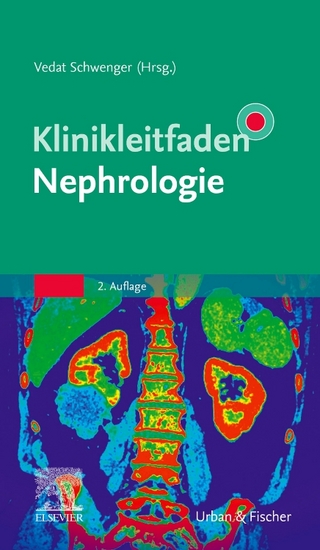
Lupus Nephritis
Oxford University Press (Verlag)
978-0-19-956805-5 (ISBN)
Severe inflammation of the kidney can indicate the serious, negative prognosis of lupus nephritis when present in conjunction with systemic lupus erythematosus (SLE), a chronic autoimmune connective tissue disease that can affect any part of the body, most often harming the heart, joints, skin, lungs, blood vessels, liver, kidneys, and nervous system. This book pulls together in one comprehensive reference the current knowledge regarding the inherited and immunologic abnormalities that have been identified in SLE, with specific reference to the development of renal disease and the way in which these factors may impact upon the chronic care of these patients.
Since publication of the first edition in 1999, the discipline of medicine has experienced some revolutionary changes in the way drugs are used to treat to immune system diseases. On the basis of careful analysis of physical make-up, the immune system, and microscopic features of the human body, it has become clear that multiple components of the immune system are responsible for renal injury and that any given patient can experience a combination of these mechanisms. With this in mind, specific therapies can be tested, and drugs that interrupt the immune response in highly specific ways are being scrutinized for their value in lupus nephritis.
This new edition reflects the updated methods of classification and advances in treatment options for SLE, and covers recent clinical trials to help treat patients using the most up-to-date knowledge available. It takes a practical approach throughout, and will be of interest to those working with patients with lupus nephritis, and those who manage their everyday care.
Edmund J. Lewis, M.D. is the Muehrcke Family Professor of Nephrology at Rush University Medical Center. Much of his career has been devoted to the study of immunopathologic mechanisms of glomerular disease, particularly lupus nephritis. He was an active participant in the International Study of Kidney Disease in Children (ISKDC), and as a member of the Pathology Committee he co-authored the first World Health Organization Classification of lupus nephritis. This led him to organize the Collaborative Study Group, whose initial study of plasmapheresis in severe lupus nephritis led to many important observations regarding clinical and histologic features which determine response to therapy in this patient population. In 2007, Dr. Lewis received the Belding Scribner Award of the American Society of Nephrology "for outstanding contributions to nephrology in the area of clinical practice and patient care". Professor Schwartz completed his M.D. at the University of Minnesota in 1967, before taking a Pathology Residency at the Mallory Institute of Pathology between 1968 and1971, and completing a Renal Pathology Fellowship, also at the Mallory Institute of Pathology, in 1973. He became Professor Pathology at Rush University Medical Center in1984. Stephen M. Korbet graduated from Rush Medical College in 1979 and did his internship, residency and Fellowship training at Rush-Presbyterian-St. Luke's Medical Center, Chicago, Illinois. He is board certified in Internal Medicine and Nephrology. Dr. Korbet has received many prestigious honors and awards. He holds the endowed chair of the "Lester and Muriel Anixter Professor of Nephrology" at Rush Medical College. He is also currently the Medical Director of Circle Medical Management Dialysis Facility in Chicago as well as the Division Chief of the Section of Nephrology, Rush University Medical Center. Chicago, IL He has also been actively involved in clinical research involving kidney disease and dialysis since 1986 until the present date. Daniel Tak Mao Chan graduated from the University of Hong Kong in 1985, and received training in nephrology and internal medicine in Hong Kong and at the Guy's Hospital in London, U.K. He is a Fellow of the Royal Colleges of Physicians in U.K. He is currently Personal Chair and Yu Foundation Endowed Professor in Nephrology at the Department of Medicine, and the Associated Dean at the Li Ka Shing Faculty of Medicine, University of Hong Kong. He was President of the Asian Pacific Society of Nephrology from 2008 to 2010. He is an Executive Committee member of the Asian Society of Transplantation, and has previously served as President of the Hong Kong Society of Transplantation. He pioneered the use of mycophenolate mofetil in the treatment of severe lupus nephritis. In addition to the treatment and immuno-pathogenesis of lupus nephritis, his other research interests include viral hepatitis in patients with renal failure.
1. Clinical Manifestations of Systemic Lupus with Renal Involvement ; 2. Autoantibodies and Lupus Nephritis ; 3. T & B Cells and the Pathogenesis of Lupus Nephritis ; 4. Complement Abnormalities in Lupus Nephritis ; 5. Pathways of Cellular Adaptive Immunity in Autoimmune Crescentic Glomerulonephritis and Lupus Nephritis ; 6. Pathology, Pathogenesis and Clinical Features of Severe Lupus Nephritis ; 7. Membranous Lupus Glomerulonephritis ; 8. Lupus Podocytopathy ; 9. Renal Vascular Involvement in SLE ; 10. Mycophenolate Mofetil as Treatment in Lupus Nephritis ; 11. Pregnancy and Lupus Nephritis ; 12. Therapeutic Recommendations
| Erscheint lt. Verlag | 4.11.2010 |
|---|---|
| Reihe/Serie | Oxford Clinical Nephrology Series |
| Zusatzinfo | 55 black and white illustrations and an 8-page colour plate section |
| Verlagsort | Oxford |
| Sprache | englisch |
| Maße | 157 x 234 mm |
| Gewicht | 614 g |
| Themenwelt | Medizinische Fachgebiete ► Innere Medizin ► Nephrologie |
| Studium ► Querschnittsbereiche ► Infektiologie / Immunologie | |
| ISBN-10 | 0-19-956805-7 / 0199568057 |
| ISBN-13 | 978-0-19-956805-5 / 9780199568055 |
| Zustand | Neuware |
| Informationen gemäß Produktsicherheitsverordnung (GPSR) | |
| Haben Sie eine Frage zum Produkt? |
aus dem Bereich


